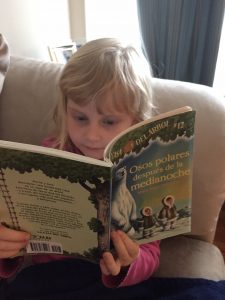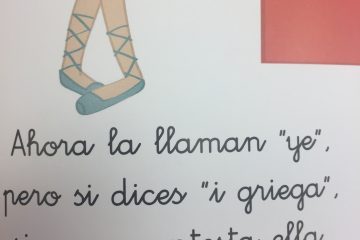This post is primarily for parents wanting to raise bilingual children and educators in elementary immersion programs, but perhaps the rest of you will find something useful here as well.
I have three children that I am trying to raise bilingual in Spanish. We started out fully committed to the one-parent, one-language method, in which I speak to our children in Spanish, and my husband speaks to them in English (he is about a Novice Mid in Spanish interpersonal, more like Novice High or even IL in interpretive). I did great with the first one. I estimate I stayed in Spanish approximately 90% of the time, even translating the storybooks I read to her before bed.
But then another came.
And quickly, another. (They’re exactly 11 months apart.)
English is my mother tongue and as such it’s my language of frustration and fatigue and frankly, there you have the two Great F’s of young multiple motherhood- we spend a lot of time frustrated and fatigued. Don’t judge me – if you stayed up til 11:30 just so you could accomplish something and then watch an episode of 24 with your spouse to have some adult time…
and then little guy got up at 6:45, spilled his Cheerios on the floor, then stepped on them, then peed on them…
and then lil gal comes around the corner to ask how to wash pencil off the wall…
Yeah. So now my Spanish interaction with them is more around the 40%-50% range.
Still, they’re quite proficient. I can’t give you proficiency levels because acquiring language as a child doesn’t spell out so easily that way. Zoe can adeptly manipulate multiple time frames in Spanish if she can come up with the vocabulary (you can hear her tell you a little story here). All three of them (now ages almost 6, almost 3, and almost 2) understand me perfectly when I speak to them in Spanish (developmentally perfectly, of course). But they are so reluctant to produce it. Not because they can’t. Just because they won’t. And the longer they won’t, the harder it gets, until one day, it will actually be because they can’t. I really, really don’t want to end up there. I don’t want to waste all this effort (and it’s a lot of effort) to end up with passive bilinguals who still think it’s just too hard to speak Spanish.

Tammra McCauley
We have a DVD with a Dora episode where Dora and her amigos are trying to get somewhere and need to pass through King Crab’s sand castle. But he won’t let them through until they do something, and they have to tell him something in Spanish. So he sings to them, “En español, por favooooor.” I feel like that’s the mantra of my relationship with my children: En español, por favor. (Really, I sing it just like him, frequently.)
¿Por favooooooor?
¿PRETTY POR FAVOOOOOR?!?!
In case your amazingly proficient, disturbingly passive learners live among the same societal factors Zoe does, let me share some resources and ideas that have helped us immensely this year.
EVERYONE thinks it’s cool except you, Zoe
I know there are people out there who say stupid stuff about why do kids need to learn Spanish, why do you talk to them like that when I can’t understand what you’re telling them (because my goal in life is for you to be able to eavesdrop, right?), but no one has ever reacted that way to me. Everyone, without fail, thinks it is so completely awesome that my kids are bilingual. And I am quick to point it out to her every time we get that reaction, which is like seventeen times a week.
See, Zoe? EVERYONE thinks it’s cool that you speak Spanish. YOU ARE SO CHéVERE!
Peer pressure, that’s what it’s all about.
Won’t you be my neighbor?
One of the best gifts in our language journey in the past year has been a blossoming friendship with a Mexican family five doors down the street. They have a girl just younger than Zoe, and a little guy just younger than Charis. ¡Hurrá! The little girl is in school and so she, too, is succumbing to the pressure to speak English (the family’s 12-year-old barely produces Spanish anymore though her parents have very little English), but the mom is there speaking Spanish, and comes over sometimes to chat and get help with writing to her landlord, for example, and the toddler hasn’t gone to school yet so he, too, has very little English.
I understand that this is more difficult in other languages, and in rural areas. But so many places are more multicultural than we might think. A few weeks ago, Zoe went to the bank to open her first bank account, and the banker who helped us was… Russian. Last weekend we went to the park to play with friends, and this whole extended family showed up, and kept showing up, with grandpas and moms and kids of all ages, speaking… Russian. They’re out there. And there’s always Skype.
There are all sorts of benefits here. My girls love to play at the neighbors’ house, which gives them lots more exposure, and they get to hear me helping this family with many things because I speak Spanish, which shows them how much purpose there is in it. And speaking of more exposure, that shows them that…
This is not a weird thing Mami does
I make a big deal out of every person we meet that speaks Spanish to us. See, Zoe? Lots of people speak Spanish!
Say it in a song
Nena #2, Charis, has been a lot slower to produce Spanish than Zoe was. She’s very verbal in English, and comprehends Spanish well, but produces almost exclusively English (except her morning drink- she comes out asking for her leche, or lately, her lech-lech). So I started singing the words for her to say. I sing puedo, she says “puedo”; I sing tener, she says “tener”; and now we’ve done it so much sometimes she’ll finish by herself: “mi leche, por favor“.
So, if they won’t even repeat the Spanish words you say, there’s a chance they’ll repeat the Spanish words you sing.
Sorry, it’s Wednesday, no English
It has helped us to pick a day in which everyone, even Papi, tries to speak Spanish. We try to make school happen in Spanish as much as possible, and include mostly Spanish in our reading. Then it occurred to me recently that we should switch all screen time to Spanish on that day, as well. That was genius. Elsa sings Libre soy, Pooh eats his miel, Flashcard Fiesta’s on the iPad. Next I need to copy all their Spanish lullabies into a strictly Spanish lullaby playlist so they even go to bed with 100% Spanish! And speaking of screen time…
Thank you, YouTube for TV
We don’t have cable because we’re not going to pay money for more time-wasting entertainment to come into our house. But we do have a DVD player that also connects to our internet and offers connections to our Amazon Prime video and a new app that showed up – YouTube for TV. There aren’t a lot of Spanish options at all on Amazon (shame on you, Amazon!) but hey, YouTube? We discovered Mickey Mouse clubhouse clips with several episodes one after the other from Spain – that’s a hit – and Dora in Spanish and their new favorite, Peppa Pig. Both girls are absolutely glued to Peppa Pig en español. Last night Zoe was singing at bathtime and I realized she was singing to the tune of Wheels on the Bus, but it was in Spanish! Voluntarily! She was singing, “El tren del abuelo hace chu, chu, chu… todo el día.” I said, “Where’d you get that song?” She said, “Peppa pig!”
Someone else tell her a silly story, please
Zoe is a very imaginative person who wants very imaginative parents. It’s so tiring to be imaginative all the time. Her mantra for the past THREE YEARS has been,
Will you tell me a silly story?
Okay, so this has been really good for my Spanish, because I have to practice narrating all the time. But it wears me out. Just wears my imagination down to a nub. Last night on the way home from our church small group she asked again. And my husband and I looked at each other like, “Your turn.” And then I had a thought. What if I could find a podcast that had a story? So I found something I’d stumbled onto a long time ago, Storynory. (It’s awesome. Your kids will love them.) We listened to two storynories and then I thought Wait. It’s Wednesday. Could I find one in Spanish?
Yes, I could. I found the podcast CuentoAventuras and started playing El lobito bueno. The girls were drawn in immediately and after we stopped the car and turned off the audio, Charis was telling us back some of the story! In Spanish. VOLUNTARILY! So get someone else to tell them a story.

Literacy matters
Zoe’s a super advanced reader. She’s reading Judy Moody, Ramona, The Secret Garden, and Magic Tree House. She loves Magic Tree House. She will read two in a single day. So of course when I saw a copy of one in Spanish at the local Barnes & Noble I had to snatch it up.
That was at least six months ago. It’s sat on her shelf ever since. But something about that Peppa Pig… and that podcast… and first thing this morning, guess what she had in her hand when she came out of her bedroom? That book. She wanted me to help her read it.
Cue: Hallelujah chorus.
She’s not exactly biliterate; she soars in English reading but I haven’t really asked her to be literate in Spanish, or even been able to expose her to as much literature in Spanish as she’s seen in English. But now? Now we can work on a new skill. Because she wants to.
Photo Angry Toddler License CC-BY
14 Comments
Comments are closed.




Thank you so much for this! I am trying my best to stay in Spanish with my 14 month old, but I hear you, it is hard! My husband is at the “I took 2 years of Spanish in high school” level, so it is pretty much a solo effort. Except once in a while I find my husband reading a book in Spanish, which is pretty awesome. Please keep sharing your bilingual kid resources!
Sounds like you’ve found some, dare I say it…motivation for them!
Yes! This is fantastic! I have a 21 month old and another on the way this summer. As a former Spanish teacher turned (mostly) stay-at-home-mom I have been trying to speak as much Spanish to her as I can. It’s surprising how much research I had to do on baby/toddler-related vocabulary! Like you mentioned, it’s very difficult not to use your native language when tired, frustrated, or in a hurry, so I appreciate these very realistic approaches to including Spanish in your day.
Oh yes, I have probably learned more vocabulary in the last 5 years than in the 10 years before that! Pacifier, carseat, stroller, bottle, burp – burp cloth?!
I felt guilt and wonder upon reading this; guilt at how quickly I gave up with my children as I kept on birthing them (4 in 5 years) and wonder at your tenacity and accomplishment.
You are a great encourager with your words.
Really, really liked this article. Trying to use Spanish with my toddler and it’s validating to hear you say that sometimes you don’t although you set out to, because of English being your language of frustration and fatigue – yes! Good resources and thoughts. Thank you.
I find your post so true even in my case. I am a Russian native, lived almost 17 years in the United States surrounded by anglophones to the point that English became my first go-to language in times of fatigue and frustration. Besides, who swears in your own language, that’s just gross! 🙂
My major mistake was my first child: young and inexperienced, I thought speaking Russian may interfere with her language development. Needless to say, after lots of research devoted to language acquisition and raising bilingual children, I did not hesitate to start Russian with my second child at birth and it paid off – he often spontaneously speaks it without prompting or bribing. My oldest is at the point now that she realizes that in order to maintain the language, she needs to speak it. Not always, not even often, but there’s a light at the end of the tunnel…
I have to admit, that the problem at this time is ME: as I currently don’t have personal contact with any Russian speakers except for the ones living on another side of the world, my own active vocabulary has suffered and so did my ease and persistence at staying in Russian when I REALLY need to make sure my kids understand my message. That’s why we all eagerly anticipate our bi-annual summer immersion experience with my family and friends after which I return language-rejuvenated and kids make enormous leaps in acquisition.
Your message for me is clear: in order to maintain MY native language, I need to make an effort and find ways to listen, read, and reach out to communicate to several local Russians that I know live in the area. By doing this, I will remain more fluent and dedicated to help my children grow bilingual through own example. Thank you for reminding me of this. Now, onto figuring out how to plan it in my daily routine…
Hmm, do I see a guest blog post coming, Natalia? 🙂
How young did you start working with your kids? My 14 month old only says a few things in English. Should we start now or after he learns some English? How do you keep them from mixing up the languages? I remember one of my professors taught her kids Spanish early and they called fish “fishcado”. 🙂
Hi Amanda, thanks for stopping by! I started the bilingual journey with my children immediately – in the hospital at birth! I spoke to them in Spanish from the moment they were born. For all of them, a Spanish word was their first word. So, I recommend starting right away.
Children growing up multilingual naturally mix their languages, and it’s not something to be worried about. They end up differentiating quite well, and from what I’ve heard, though they may seem delayed in their language skills in either given language, by around age 5 they have caught up to that kindergarten level in both languages. My oldest 2, both girls, have been verbally advanced in both languages as toddlers, but my son was delayed in his verbal development (too focused on jumping off of things, I guess). One of my favorite blogs used to be one called “Wanna Jugar With Migo?” – named after something one of the author’s children said to another one day.
I recommend exploring Bilingual Monkeys, too. Have a great journey!
Thank you!!!!
[…] forward many years, and I got married, and had some kids and a crazy bilingual family journey (listen to my daughter at 4 1/2 tell a story with DoodleCast), and then my father […]
Hi Sara-Elizabeth! Reading this post after today’s pingback, and checked out CuentoAventuras. It’s great! Would you happen to know of any apps that could slow down the speed of the story for my students with less listening proficiency? Thanks for any tips!
Yes – the iTunes app slows it to half speed (tap the 1X in the bottom corner a few times), and if they do it, I’m sure other apps do as well!